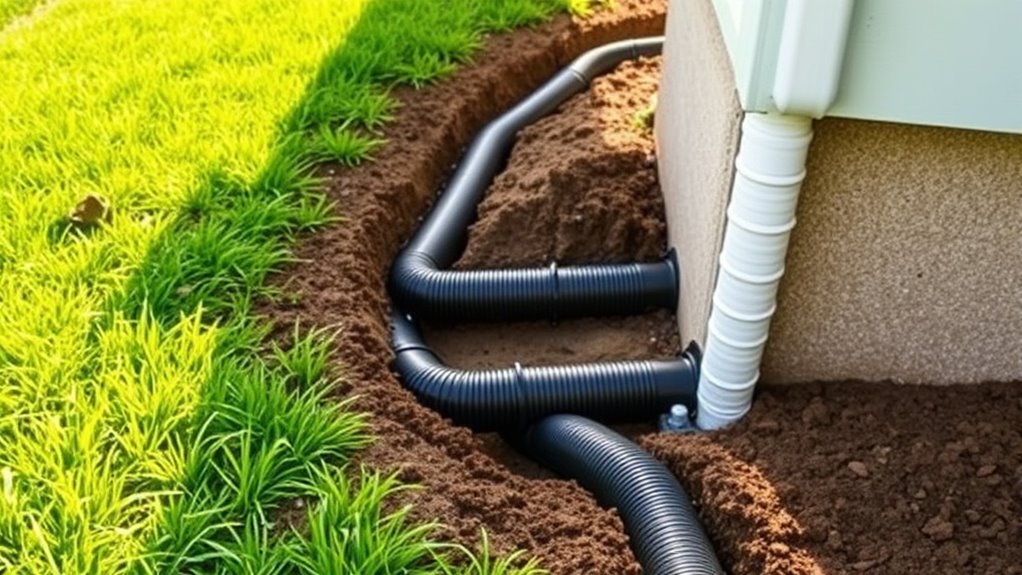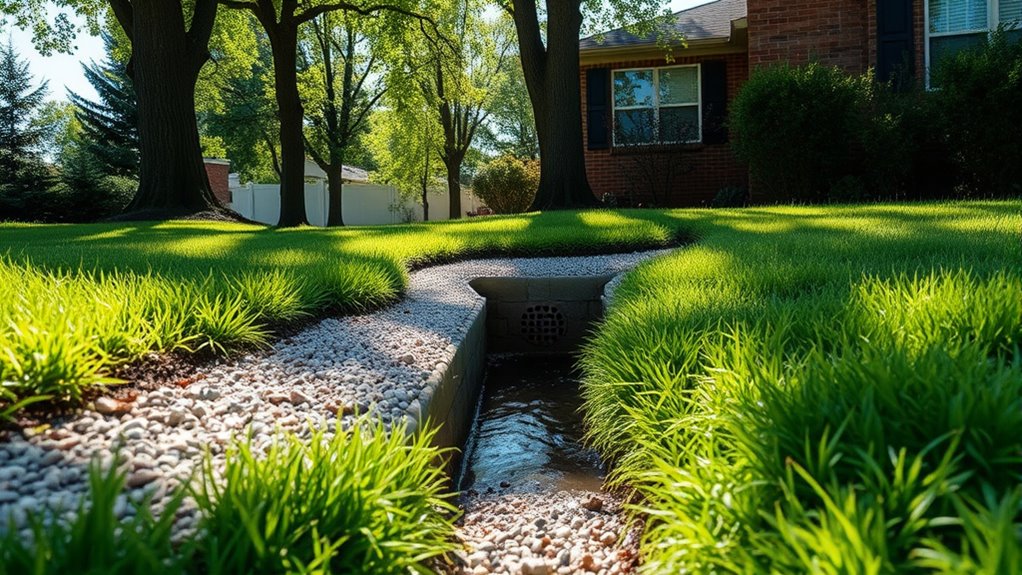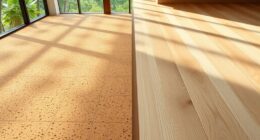Proper drainage around your home is vital to prevent water from pooling and causing damage. When gutters are clean and functioning well, and your landscape slopes away from the foundation, water flows safely away from your property. This helps avoid flooding, foundation issues, and costly repairs. Maintaining these systems guarantees your yard stays dry and your home remains protected during storms. Keep these tips in mind to safeguard your home’s future as you explore more ways to improve drainage.
Key Takeaways
- Proper drainage prevents yard flooding and protects your home’s foundation from water damage.
- Regular gutter maintenance ensures efficient water flow and reduces overflow risks.
- Correct landscape grading directs water away from the house, preventing seepage and soil erosion.
- Combining gutter care and grading optimizes water management during storms.
- Proactive drainage solutions safeguard your property, saving costs on repairs and structural issues.

Have you ever wondered why your yard floods after heavy rain? Often, the answer lies in how well your property manages water runoff. Proper drainage isn’t just about preventing puddles; it protects your home’s foundation, landscaping, and overall safety. Two key elements in guaranteeing effective drainage are gutter maintenance and landscape grading. Neglecting either can lead to costly repairs and persistent water issues.
Gutter maintenance plays a vital role in directing water away from your home. Over time, gutters can become clogged with leaves, twigs, and debris, causing water to overflow and spill down your exterior walls or pool around your foundation. Regularly cleaning your gutters, especially before the rainy season, guarantees that rainwater flows smoothly through the system and into downspouts. Installing gutter guards can also minimize debris buildup, reducing the need for frequent cleaning. When gutters function properly, they prevent water from cascading onto your roof or pooling near your foundation, which can lead to cracks, leaks, or even basement flooding.
Landscape grading is equally important because it determines how water naturally flows across your yard. Think of your property as a miniature landscape designed to channel water away from your house. If the ground slopes toward your foundation, water will accumulate near your walls, increasing the risk of structural issues and mold growth. To prevent this, you should assess the slope of your yard and make adjustments where necessary. This can involve adding soil or reshaping the landscape to create a gentle slope away from your home. Proper grading guarantees that during heavy rains, water is directed toward storm drains, gutters, or designated drainage areas, rather than seeping into your basement or pooling against the foundation.
Both gutter maintenance and landscape grading work together to create an effective drainage system around your home. When gutters are clear and functioning properly, they handle most of the water coming off your roof. Meanwhile, properly graded land ensures that this water is carried away from your property efficiently. Ignoring these details can lead to water accumulation, soil erosion, and long-term damage to your home’s structural integrity. Regularly inspecting and maintaining these systems isn’t just about keeping your yard dry; it’s about protecting your investment and guaranteeing your home remains safe and comfortable during storms. Taking proactive steps now can save you from costly repairs and the headaches of dealing with water damage down the line.
Frequently Asked Questions
How Often Should I Inspect My Drainage System?
You should inspect your drainage system at least twice a year, ideally in spring and fall. During gutter maintenance, clear out leaves and debris to prevent clogs. Check landscape grading to ensure water flows away from your home effectively. Regular inspections help identify issues early, avoiding costly repairs. Don’t forget to look for standing water or erosion around your foundation, and address problems promptly for ideal drainage.
What Are the Signs of Poor Drainage?
Ironically, signs of poor drainage often sneak up on you. You might notice garden erosion that no amount of fertilizer can fix or basement flooding after a heavy rain, making it clear your drainage isn’t up to par. Other clues include pooling water in your yard, soggy patches, or a musty smell. Pay attention—these signs warn you that your home’s drainage system needs attention before bigger problems strike.
Can Improper Drainage Cause Foundation Damage?
Yes, improper drainage can cause foundation damage. When water pools around your home or soil erosion occurs, the soil beneath your foundation becomes unstable, leading to cracks and shifts. Excess water weakens the soil and puts pressure on your foundation, increasing the risk of settling or cracking. To prevent this, guarantee proper drainage to direct water away from your home, reducing water pooling and soil erosion that threaten your foundation’s stability.
Are DIY Drainage Solutions Effective?
You might think DIY drainage solutions like rain gardens or French drains are foolproof, but they often aren’t. Sure, you can dig a trench or plant some native plants, but if you don’t plan carefully, your efforts could backfire. Effective drainage requires understanding water flow, soil type, and proper installation. While DIY options can work, consulting a professional guarantees your rain garden or French drain actually protects your home from water damage.
When Should I Hire a Professional for Drainage Issues?
You should hire a professional when landscape grading and gutter maintenance don’t solve drainage issues. If water pooling persists, or if you notice uneven land or foundation concerns, it’s time to call experts. DIY solutions might work temporarily, but professionals can evaluate your yard’s slope, guarantee proper grading, and optimize gutter systems. This prevents long-term damage and ensures your home stays dry and safe.
Conclusion
Don’t let poor drainage cause costly damage or stress. By ensuring your home’s drainage system is effective, you protect your family and your investment. It’s easy to overlook, but neglecting this can lead to serious issues like mold, foundation cracks, or flooding. Think of it as caring for your home’s health—taking small steps now saves you big problems later. You deserve a safe, dry, and comfortable home; proper drainage makes that possible.









